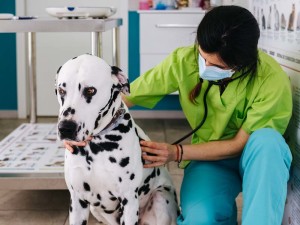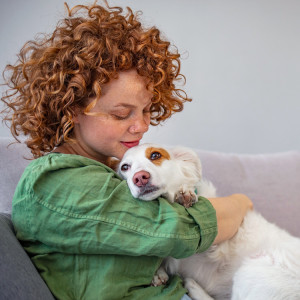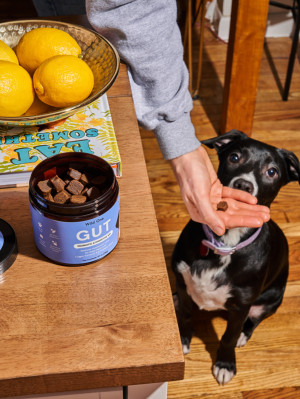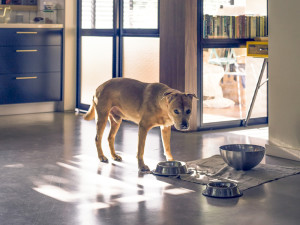Why Does Your Dog Burp So Much?
You love your pup, but that’s... pretty gross.

Share Article
In This Article:
Is it Normal for Dogs to Burp? Why Do Dogs Burp? How Do I Get My Dog to Stop Burping? Should You Go to the Vet Because of Your Dog’s Burping? Frequently Asked Questions
We’ve all been there: Your dog cuddles up close and you lean in for a snuggle or kiss, only to be met by a deep, loud belch. Whether you find it hilarious or repulsive, burping is a normal reflex for animals and humans alike. However, if you find that your dog seems to be burping, uh, excessively, there may be more going on. Frequent burping can be a sign that there is too much air in their stomach, which can happen for a number of different reasons. Read on to learn what might be causing frequent burping and what you can do about it.
Is it normal for dogs to burp?
Burping is a perfectly normal reflex for dogs. The technical term for burping is eructation, and it occurs when air or gas distends the stomach, triggering a relaxation of the passageway between the stomach and esophagus. This allows the air to escape upwards, and create a burping sound as it passes out through the mouth.
Burping is most common shortly after eating or drinking; dogs typically swallow some air while they are doing these things. Dogs that are burping more frequently throughout the day, have very foul-smelling burps, or additional symptoms including changes in appetite, weight loss, vomiting, diarrhea, or loud stomach rumbling are more likely to have an underlying medical condition that needs to be checked out by a veterinarian.

Why do dogs burp?
Anything that causes air or gas to build up in the stomach will trigger a burp. Some of the most common causes include:
Eating or drinking
Whenever dogs eat or drink, they also swallow some air which can lead to burping. Some dogs burp more than others after eating and drinking and this may be affected by the way they eat, including if they eat too fast, and the type of food they are eating.
Underlying health problems
Many different underlying health problems can also cause burping if they contribute to additional air or gas accumulation in the stomach. This includes digestive problems like food sensitivities, abnormally slow movement of the digestive tract known as poor motility, and breathing problems including upper airway disorders and respiratory infections. These can increase the amount of air dogs swallow, or cause more gas to form during digestion, leading to more burping.
Stress or anxiety
Stress and anxiety can cause more burping in two ways. The first is that many dogs will develop digestive upset when they are stressed and this can affect how quickly food moves through their stomach and whether additional gas accumulates in the process. The second is that anxious dogs often swallow more air as a result of panting and whining.
Dog breed
Brachycephalic dog breeds — like like French Bulldogs, Shih Tzus, Pekingese, Pugs, and Bulldogs — that tend to have smushed faces tend to routinely swallow more air than other dogs. This is a result of common deformities in their airways and respiratory pathways. As a result, their stomachs become more distended with gas, leading to more frequent burping.
How do I get my dog to stop burping?
Since burping is a natural reflex, it is not possible to stop dog burping altogether, but there are steps you can take to try to minimize the amount your dog burps. Some strategies to consider are:
Use a slow feeder dog bowl for meals.
If you notice that your dog tends to burp the most right after eating, a slow feeder bowl may help. These bowls are designed with extra nooks and crannies to make it impossible for dogs to scarf down their food. It helps slow them down and take smaller bites, which may prevent them from gulping so much air.
Feed your dog smaller, more frequent meals.
This is another good strategy for dogs that tend to eat too quickly and may be swallowing a lot of air in the process and for dogs that have motility problems. Try splitting your dog’s feedings up into multiple portions that you can feed throughout the day. This will prevent your dog’s stomach from getting so distended at each meal and may help with some underlying digestive problems that could also cause burping. You can also use this as an opportunity to put some of these meals into puzzle feeders to provide mental enrichment at the same time.
Change your dog’s diet
Some dogs accumulate additional gas in their stomach if they have a food allergy or other digestive issues. This may cause irritation and inflammation within the digestive tract as well as prolonged transit of the food through the digestive tract. Consult your vet for the best recommendations for dog food for your pup’s specific gastrointestinal issues. Your dog may need a special diet like a hypoallergenic formula, a sensitive stomach formula, or low-fat food option.
Exercise
Exercise can be both a promoter of healthy digestion and may cause delayed digestion in other instances. Slow to moderate exercise like walking can help to promote motility in the digestive tract, meaning that it may help material move through more quickly. Be sure that your dog gets adequate daily walks. High-energy exercise, like running and agility work, can actually slow digestion and emptying of the stomach.
This means that you should plan accordingly if you know your dog will be engaging in high intensity activity. Avoid feeding your dog large meals right before or right after this kind of activity. Choose small meals that will be packed with nutrients and time them so that your dog is not exercising with a full stomach.
Consult your vet
There are a number of medical conditions that can lead to increased burping along with other changes in your pup’s health. It is important to consult with your vet if you notice other concerns, or if your dog continues to burp frequently despite making some of the changes listed above. There are effective medications that help with specific digestive problems and it is best to address these signs before they lead to more serious health problems.
Should you go to the vet because of your dog’s burping?
If your dog is burping very frequently or has other concerning changes in their health, it is important to see a vet right away. For dogs that only burp occasionally after a meal, there is nothing that can be done to stop them, despite your hopes for better table manners.
When are dog burps dangerous?
Burps are not dangerous, but they may be an early indication of more serious problems. Certain digestive problems can lead to an increase in the accumulation of gas within the stomach, which may then lead to more burping. This includes conditions like food allergies, inflammatory bowel disease, and motility disorders that slow the emptying of the stomach.
Any time a dog has additional signs like vomiting, diarrhea, lethargy, loss of appetite, or pain, they need to be checked out by a vet right away. Dogs that have a lot of gas or fluid in their stomach may also be at risk for extreme stomach distension, known as bloat. This can be very painful and can also put them in danger of a life threatening condition where their stomach can then twist, known as a gastric dilatation and volvulus, or GDV. Dogs with this condition have much more extreme signs including gagging or dry-heaving without producing any vomit, weakness, collapse, or a visibly distended, painful abdomen. Any of these signs are a medical emergency and require immediate medical attention.
FAQs
Is burping normal in dogs?
Burping is 100 percent normal in dogs, but excessive burping could be a sign of an underlying medical condition.
How do I get my dog to stop burping?
While you cannot completely stop your dog from burping, there are steps you may be able to decrease the amount they burp by changing their feeding routines and taking other preventative measures.
Should I take my dog to the vet for burping too much?
Yes, if you believe your dog is burping excessively and/or they have any other signs of illness, it is important to have them evaluated by a vet.
References
Cave, Nick. Canine and Feline Gastroenterology: Chapter 15 - Gastrointestinal Gas: Eructation, Borborygmus, and Flatulenceopens in new tab. W.B. Saunders, 2013, pp. 124-128.
Grobman M, et al. “Incidence and characterization of aerophagia in dogs using videofluoroscopic swallow studiesopens in new tab.”J Vet Intern Med. vol. 38, no. 3, 2024, pp. 1449-1457.
Lang, Ivan M et al. “Digestive and respiratory tract motor responses associated with eructation.opens in new tab” American journal of physiology. Gastrointestinal and liver physiology. vol. 304, no. 11, 2013, pp. G1044-53.

Dr. Amy Fox, DVM
Amy Fox, DVM is a small animal veterinarian in New York City with over thirteen years of experience in a mixture of general practice, emergency medicine, and shelter medicine. A lifelong animal lover, Dr. Fox studied biology in college and then worked as a veterinary nurse before pursuing veterinary school at Cornell University. Her expertise includes surgery, dentistry, and management of chronic conditions, and she is interested in toxicology, pain management, nutrition, care of senior pets, and educational outreach. Dr. Fox also enjoys writing about veterinary medicine and teaching, and her work has previously appeared in Spruce Pets. In her free time, she loves to cook, garden, go for long runs, and hang out with her goofy mixed-breed dog May, who provides never ending comic relief!
Related articles
Why Does My Dog Keep Licking Their Lips?
It’s not always just because they want whatever you’re eating.
![Woman sitting at the kitchen table eating breakfast with her cat eating next to her]()
Gut Reactions: Pets Have Shockingly High Levels of E. Coli
A new report finds that one in three dogs and one in seven cats have unhealthy levels of E. coli present in their gut microbiome.
![Black dog sitting beneath a table being fed a Wild One GUT supplement]()
Best Probiotics for Dogs
Your pup should keep these in their medicine cabinet.
![Dog in high contrast lit hallway standing near a food bowl]()
Your Pet’s Behavioral Issues Might Be All in Their Gut
It’s a gut thing: Your dog’s GI issues could be linked to their mental health.
![Pomeranian stands in front of a yellow bowl of homemade probiotic yogurt]()
Are Probiotics Actually Something Your Dog Needs?
Time for a (literal) gut check from four experts.
![A dog sitting on the floor with a bowl of kibble.]()
Everything You Need to Know About Your Dog’s Gut Microbiome
Microscopic organisms may reveal pathways to better health for your pet.








